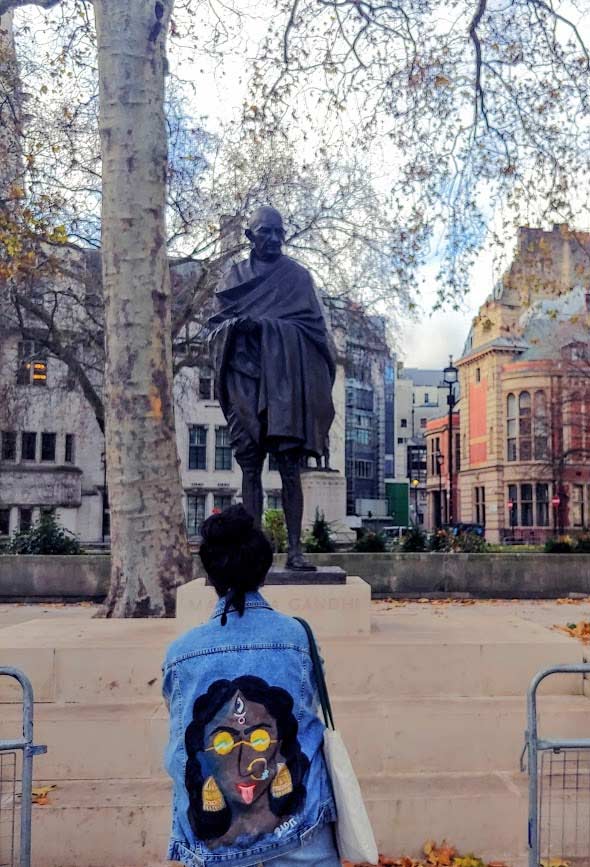When I was young, my parents, both immigrants from India, made sure that my brother and I were both aware of the long and brutal history of British colonization of their homeland. But even with that education—and now, with three months of living in London under my belt—I am still struggling to grasp the complexities of simply existing as a brown person in London today. In preparing for my semester abroad, I did expect the city to be a place where I would be able to recontextualize my South-Asian identity, knowing that people of any diaspora must have differing experiences depending on where they grow up. However, I didn't anticipate being so frequently reminded of the far-reaching arm of colonization and, in turn, having to come to terms so abruptly with my place within that history.
In my first week here, for example, I visited St. Paul's Cathedral. As I marveled at the cathedral's architectural beauty, I was struck by two objects, both of which could have easily been overlooked: One was a marble statue depicting Thomas Fanshaw Middleton, Bishop of India, blessing two kneeling Indian children. The text engraved on the statue explains that it was commissioned jointly by the Society for Promoting Christian Knowledge and the Society for the Propagation of the Gospel. The second monument that caught my attention was a tablet commemorating "201 years of faithful service given by British, Indian, and Gurkha soldiers." The tablet explains that between the two World Wars, over three million soldiers from this voluntary army were on active service.
Though these two objects might seem inconspicuous enough, given the British Empire's long and involved history in India, they reminded me of the gravity of the oppression that my ancestors faced. And in that moment, I realized that, though I may feel no personal connection to the Crown, my own grandparents were born British subjects. I was reminded of how recent it was that South-Asian people had to fight for independence, and of how they are still fighting wars that were instigated by colonizers over 50 years ago. In that moment, I felt small and helpless in the presence of a history that I never chose to be born into. I have always considered myself relatively privileged, since my parents had the opportunity to immigrate for a better education and quality of life. But, I rarely think about why they needed to emigrate in the first place, the circumstances that they left behind, and the small traumas and sacrifices they have endured as a result of leaving a collectivistic culture of family and community for a life of relative isolation.
This is only one example of how I've been caught off-guard by how deeply woven colonization is in the fabric of British culture. From the completely tone-deaf wall texts in the British Museum to casual mentions of how tea-drinking culture "came from" India, as though there were some sort of mutually beneficial exchange involved, it seems as though discourse surrounding British culture has swiftly moved past the history of colonization, while the victims must deal with long-lasting consequences. Of course, I understand that British people of today have no reason to feel guilt or shame for the wrongs of those who came before them. But, considering that billions of people living in the Global South today are still grappling with corrupt governments, failing infrastructures, and conflicts over arbitrarily-drawn borders, I can't help but wonder if it is totally fair for those who aren't suffering to just move on.
Despite these frequent moments of frustration at how powerless I am to history—or perhaps because of them—I have never been more proud to be a first-generation Indian-American woman. Especially in Europe, while being away from my family and community back home, I am endlessly amazed by the immediate connection and comfort I feel when I converse with a brown stranger—or even just make eye contact. I am grateful for every South-Asian person I encounter here, whether it's the stranger speaking in rapid, straight-from-Chennai Tamil on the Metropolitan line or the Goan shopkeeper in Oxford who told me, "If you know how to cook, you'll never be lost." I'll never forget the grandfatherly man who approached me on the platform at Harrow-on-the-Hill Station to recommend that I put gram flour on my face to clear my skin—the same advice that I have been given by my own grandparents. Even when I traveled alone in Germany during my fall break, I felt at home when the man in Berlin who sold me a doner said "jai Hind" instead of "bitte schoen" as he handed me my sandwich.
 Uma in front of the Gandhi Statue.
Uma in front of the Gandhi Statue.
Though the inescapable history of my ancestors' oppression—and my inheritance of it—is painful, it is, in many ways, easier to be South-Asian in London than it is in America. Here, there is no equivalent to the concept of the "ABCD" (American-Born Confused Desi) because South Asians have been migrating to the UK in large numbers for many, many decades. That first-generation identity confusion is a thing of the past for Londoners, while in the US, we're still in the thick of it. In the US, brown people that I know often feel an urge to either whitewash themselves or adopt parts of black culture. Because many non-brown Americans are confused by the notion of a South-Asian person who doesn't conform to stereotypes, it is often easier to just pick a side—black or white. Thankfully, in London, because of the historical proximity that Britain has had with South-Asian cultures, as well as the cultures of all other previously colonized nations, there is no need to pick sides—and, arguably, there are no sides to pick. So despite the waves of anger, frustration, and helplessness that I feel, I also feel a newfound closeness to my family and my history, which has allowed me the freedom to simply exist.








